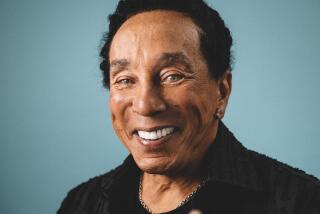Nine Lives of Mickey Rooney by Arthur Marx (Stein & Day: $17.95; 320 pp., illustrated)
- Share via
For starters, there are reasons I should disqualify myself from reviewing “The Nine Lives of Mickey Rooney” by Arthur Marx. Good and important reasons like an old acquaintanceship with the star as well as knowing many characters in the supporting cast. Then, too, I helped the author get his first novel published in 1951 and we may even be related, although it’s not certain. Probably the most potent reason to back off is that I’m mentioned in the text quite complimentarily. To consider making a fair and honest report required a lot of soul-searching but I elected to follow the dictates of my conscience. Now that you know this, the decision to read on is up to you.
Let’s face it, a book like this that dissects and analyzes a complex individual like Mickey Rooney is a formidable attempt at biography. It isn’t a matter of whether he has nine lives, as the title claims. After all, who’s counting? What is incontrovertible is that since he jumped into a spotlight at a burlesque theater more than 60 years ago, Mickey has appeared in so many stage, screen and television vehicles that they boggle the mind. Arthur Marx makes a valiant try to unboggle them.
He names almost all of them and documents how they happened. His research includes fascinating quotes the persons involved with them told him, friendly and unfriendly, from producers to agents and representatives, the pros and con-men, one might say. Charting the star’s zigzag transitions as actor/comic/composer/director/scriptwriter in the entertainment world, plus ventures into entrepreneurism and even religion, the author is truly entitled to call this incredible dynamo a “mighty mite.”
Mickey’s nine lives may be a mythical figure but his eight wives are real enough. Starting with number one, Ava Gardner, these marriages and subsequent problems have a fascinating consistency in the way they begin and the way they end. Mickey’s matrimonial misadventures provide the most interesting sequences in the book, and the author pulls no punches describing the inconstant husband’s erratic meanderings as he careens his way down these many paths to marital disharmony. While these anecdotes are engrossing, they make it appear at times that the biographer had scant love for the object of his collection.
As author, Marx allows himself the luxury of airing an animosity that follows the popular line against Mickey’s long-time boss Louis B. Mayer, traditionally taken by those who never knew the man. He doesn’t describe the Mayer I knew, and I would disagree with his statement that Mayer, whom he calls “ratlike” and “given to insincere rhetoric” tried “desperately (during World War II) to get an Army deferral for his biggest box-office attraction.” There is no mention of Clark Gable, Robert Taylor, Jimmy Stewart and other MGM actors who flew into battle actions, and they could hardly be considered bit players by a pragmatic studio head. However, Mickey “wasn’t scared of war,” Marx explains, “but of losing Ava for good.” Well, the book contains many bright, enjoyable laugh lines that come on you suddenly, befitting the writing of a son of Groucho.
Withal, Mickey Rooney’s hits and flops make for an absorbing tale, especially in disclosing how this extremely human being managed to consistently snatch defeat from the jaws of triumph. It is a tragicomedy that could have been structured by Aristophanes, its final darkness before dawn climactically routed when the success of “Sugar Babies” provides an ending as happy as any Hardy Family episode.
If my intimacy with the subject matter offered no insuperable handicap to writing this review, it did cause me to observe and regret an inordinate amount of errors, more negligent than typographical, that should have been caught. The author, the editor or the proof-reader should have known Carole Lombard died in a plane bound for Los Angeles and not Indianapolis, that Mickey’s present wife is Jan Chamberlin and not Jan Sterling as her photos are captioned and that Colleen Moore is not Coleen More. These and other similar careless mistakes detract from a major accomplishment, for this.
Assemblage of the life or lives of Mickey Rooney is the best of Marx’s eight books. He will probably find it, like Mickey Rooney, a tough act to follow.
More to Read
Sign up for our Book Club newsletter
Get the latest news, events and more from the Los Angeles Times Book Club, and help us get L.A. reading and talking.
You may occasionally receive promotional content from the Los Angeles Times.










